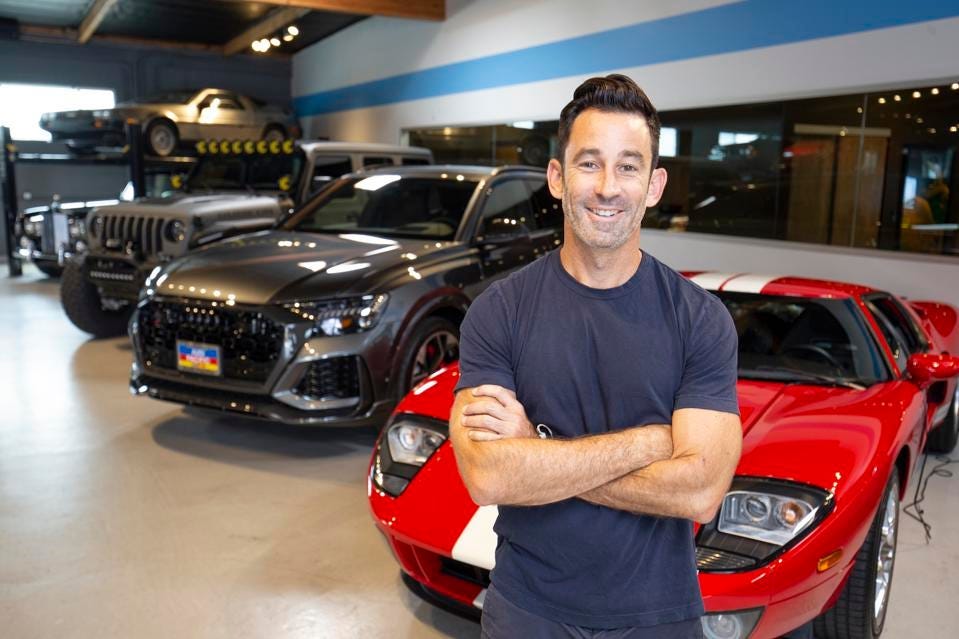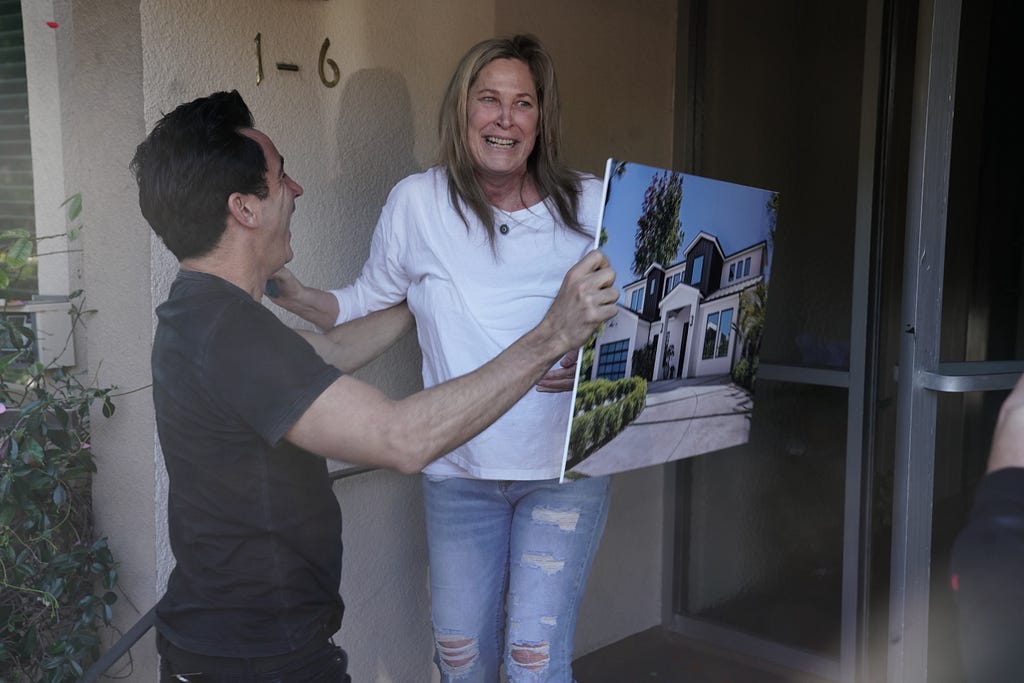
Nothing Is as Bad as the Fear of It — We spend so much time projecting out what could go wrong in our lives. We have these incredible imaginations. When we’re kids, we use our imagination to think about what’s possible. And when we’re adults, we tend to use our imaginations to think about what could go wrong.
As part of my series about “individuals and organizations making an important social impact”, I had the pleasure of interviewing Matt Pohlson, CEO and Co-Founder, Omaze.
Matt Pohlson is the co-founder and CEO of Omaze, the online fundraising platform that raises funds and awareness for charities by offering people the chance to win dream-come-true experiences and prizes. Omaze winners have received one-of-a-kind cars, gone on double dates with George and Amal Clooney, dined with Ben Affleck and Matt Damon, and taken home 1M dollars, all while helping raise critical funds for charities around the world.
Matt graduated from Stanford University and received his MBA from the University of Pennsylvania’s Wharton School of Business. He currently resides in Los Angeles.
Thank you so much for joining us in this interview series! Can you tell us a story about what brought you to this specific career path?
I spent my career before Omaze in cause content, using storytelling to inspire action. We had done a bunch of global concerts and documentaries with people like Oprah, Bono, Jay-Z, Queen Rania of Jordan, President Clinton, Bill Gates, and many others. These people authentically wanted to do good, but we just realized we weren’t doing that much good. We were creating a lot of awareness, but not a lot of impact.
Then one night Ryan and I went to an event that Magic Johnson was hosting for the Boys and Girls Club. He was auctioning off the chance to play basketball and go to a Lakers game, but it was only available to the high net worth individuals sitting in the room. We were in the room, but not high worth individuals. So
we sat and watched as the auction went up to $15,000 and we couldn’t afford to participate. But Magic was our childhood hero. So when we were driving home that night we said, instead of making that experience available only to the people lucky enough to be in that room, we made it available to everyone online for the chance to win, you could raise so much more money and so much more awareness.
Can you share the most interesting story that happened to you since you began leading your company or organization?
We have had a lot of wild times at Omaze, but the most unique was probably when I clinically died. I flatlined for 4.5 minutes and it was only through a series of miracles — including my mom bursting into the room and coaching me back to life — that they saved me. This experience fundamentally changed who I am as a leader and the direction of the company.
It has been said that our mistakes can be our greatest teachers. Can you share a story about the funniest mistake you made when you were first starting? Can you tell us what lesson you learned from that?
I’ve made so many mistakes it’s hard to choose. I got feedback that I wasn’t doing a good enough job empowering and trusting our leadership team. I’d developed a habit of trying to solve their problems for
them when they were stuck. She knew I was trying to help and show I was in the trenches with them, but by wading into the details, I was having the opposite effect.
That hit me hard. The next day I read an article by the acclaimed communications expert Nancy Duarte. She explained that the mistake most presenters make is that they think they are the star of the show. “Just because you’re on a stage does not make you the savior everyone has been waiting for. Recognize that you are Yoda, not Luke. The most important people in the room are your audience: make them the heroes of your story.”
The light went off. That same maxim applied to leadership. You are Yoda, and your team is Luke. From the moment we hired our first employee I felt an overwhelming rush of responsibility. I could live with messing up my life if we failed. But now I could potentially mess up hers. And not only that, she was a young mom. I’d be messing up her daughter’s life too. I took on that weight, because I thought it was my job to be the hero. I had to protect my team and keep them safe. My mentality came mostly from a desire to serve, but it didn’t make it any less wrong. Now I realize that’s the last thing they wanted from me.
Realizing that our team members are the heroes, and I am just one of their guides, fundamentally changed the way I look at leadership. I had been a manager, when what my team needed was a coach. As Bill Campbell, coach to some of the most accomplished CEO’s of our time said, “Leadership is about recognizing that there’s greatness in everyone, and your job is to create an environment where that greatness can emerge.”
If there is one lesson I wish I knew at the beginning of the journey it is this.
Can you describe how you or your organization is making a significant social impact?
We are lucky that social impact is at the center of everything we do. We give everyone a chance to dream big and win once-in-a-lifetime prizes while helping to make the world a better place. This sustainable approach to fundraising means that nonprofits can spend less time and money raising funds, and instead focus on serving the needs of their communities.
We’re grateful to have partnered with amazing people to raise nearly $200M for over 500 charities around the world.
Can you tell us a story about a particular individual who was impacted or helped by your cause?
We partnered with Richard Branson and Virgin Galactic to send someone to space. In November of 2021, we announced Keisha Schahaff of Antigua as the winner.
Keisha has dreamed of going to space her whole life. Keisha is bringing her 17-year old daughter, who is an astrophysics student, and dreams of being an astronaut one day. They will be the first people from Antigua and the first mother-daughter combo in space..
Are there three things the community/society/politicians can do to help you address the root of the problem you are trying to solve?
The villain we are fighting is inequality of opportunity. We are offering our customers the chance to win prizes they can’t access otherwise. We are offering our cause beneficiaries resources and opportunities
previously unavailable to them. This is obviously a complicated and multifaceted issue. If I had to choose one thing for us to invest in more as a society it’s educational opportunities for people in underserved communities.
How do you define “Leadership”? Can you explain what you mean or give an example?
In addition to what I said before, I think leaders need to learn to connect to their own inner voice. “There’s a lot of data, there’s a lot of neurons in your gut, there’s neurons in your heart. There’s information that’s coming through outside of your brain that you should listen to. But it can get noisy. By stepping back and doing whatever it takes for you to get still — whether that’s meditation, which is what I do, breathing exercises, listening to music, working out, whatever that is for you.”

What are your “5 things I wish someone told me when I first started” and why. Please share a story or example for each.
#1 Nothing Is as Bad as the Fear of It
We spend so much time projecting out what could go wrong in our lives. We have these incredible imaginations. When we’re kids, we use our imagination to think about what’s possible. And when we’re adults, we tend to use our imaginations to think about what could go wrong.
#2 Replace Fear With Love
The opposite of love is not hate. The opposite of love is fear. So if you get rid of that space for fear, you can spend a lot more time putting love out in the world.
#3 We Don’t Realize How Much Is Possible
We all have this kind of superpower that is available that we’re not accessing, which is kind of a greater consciousness. You can tap into other pieces of information, other energy, that once you do that, the scope of your problem seems so much smaller because you realize there’s a lot more going on than what we’ve created in our world.
#4 Time Away Is Invaluable
Some of my most valuable ideas have come from time off. You notice some things that you wouldn’t have noticed … or there’s certain things that you tolerated before because you just did on a daily basis. When you step back, you’re like — wait a second. Why are we doing that?
#5 When You Don’t Know What to Do, Do Nothing
There’s this belief in startups that if you’re not moving constantly in perpetual motion, then you’re done. You’re either moving or you’re done. And so we’re always scrambling, and we feel anxious if we’re not working on our thing. But when it comes to the pivotal decisions for a company, sometimes less is more.
Because you want to be proactive, you’ll go talk to everybody. You’ll get opinions of 15 different people … but they’ll end up countering each other inevitably. And then I’ve gotten so many opinions that it ends up drowning out my own voice. And so that’s where doing nothing comes in.
You are a person of enormous influence. If you could inspire a movement that would bring the most amount of good to the most amount of people, what would that be? You never know what your idea can trigger. 🙂
This is hard to choose, but I think I’d make a movement where people around the world did a service gap year between high school and college. This would create several benefits. This army of young people would be able to make a real difference with their time. Even more powerful, it would create an environment from all sorts of backgrounds to work together and create opportunities for connection and understanding.
Can you please give us your favorite “Life Lesson Quote”? Can you share how that was relevant to you in your life?
“Everything you want is on the other side of fear.” — George Addair
Is there a person in the world, or in the US with whom you would like to have a private breakfast or lunch with, and why? He or she might just see this, especially if we tag them.
Oprah. Not only is she a brilliant leader and business woman, she has inspired so many people to become more conscious.
How can our readers further follow your work online?
○ OMAZE
■ https://www.facebook.com/omaze
■ https://www.instagram.com/omaze/
■ https://www.youtube.com/user/teamomaze
■ https://www.linkedin.com/company/omaze/
○ MATT POHLSON
■ https://www.instagram.com/mattpohlson/?hl=en
■ https://www.linkedin.com/in/matthew-pohlson-4313b05/
Thank you for these fantastic insights. We greatly appreciate the time you spent on this.
Social Impact Heroes: Why & How Matt Pohlson of Omaze Is Helping To Change Our World was originally published in Authority Magazine on Medium, where people are continuing the conversation by highlighting and responding to this story.
